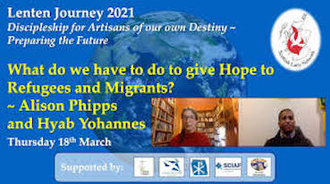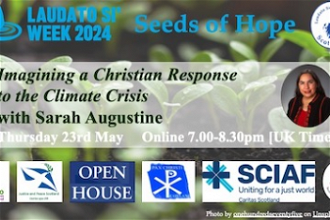Scottish Laity Network Lenten Series 5: What do we have to do to give Hope to Refugees and Migrants?

The fifth session of the Scottish Laity Network's Lenten Journey 2021 was a powerful evening of being invited to read the signs of the times as a spiritual battle in which the powers and principalities that promote the politics of death were named and denounced by our companions Alison Phipps and Hyab Yohannes. Our theme for the evening was What do we have to do to give Hope to Refugees and Migrants? but as the evening progressed there was a strong sense of the Hope that refugees and migrants can give to us.
As is our tradition we began with praying Diarmuid O'Murchu's Prayer to the Holy Spirit and the line 'Shake us of our complacency' infused the whole evening. To conclude our opening prayer Alison read her poem 'Hearkening' a reflection on Simon of Cyrene.
Then Hyab in a strong but gentle way invited us to view an image by the Eritrean artist Michael Adonai whilst we listened to poem In Lampedusa by Ribka Sibhatu. The poem was based on the real-life events of the night of 3 October 2013, when a boat of migrants from Libya sank off the coast of the Italian island of Lampedusa. The boat had many Eritrean and Ethiopian passengers on board. 368 people died! 357 Eritreans died!
In the poem we heard the story of Yohanna who died while 'birthing her son into the fish-filled sea', Hyab gently reminding us that Yohanna's story is not unique, it is a story that many Eritrean refugees can personally relate to.
Since 2014, more than 20,000 migrants have died trying to cross the Mediterranean sea. Many thousands perish every year - in the Sahara desert, in Myanmar, in Syria, in Yemen, in Ethiopia, in Europe, in the Americas and in many other places as well. Over 2.6 million refugees remain immobilised and impoverished in refugee camps in different parts of the world. Unknown number of refugees remain trapped in detention centres and special camps.
Then Hyab led us from the stories of despair and turned our theme around to ask 'what are the signs of hope that refugees bring to us'?
- In surviving the despair.
- In praying together.
- In eating together celebrating together and reaching out to each other.
- In sharing and receiving gifts with each other.
- In seeking refuge despite all the challenges.
- In getting right to remain even though it is limited.
- In calling back home and telling your family you have reached your destination safely.
- In singing hymns together whether it's in a church or in a community centre.
These signs of hope, he said, are signs that you might find among many refugees and be able to tap into among the many refugee communities that have been allowed to flourish. Finally, to bring home the power of singing hymns together he played a video of a Catholic hymn sung by Eritrean Catholics in Addis Ababa and dedicated to Eritrean Catholics who are currently struggling and with the war situation in the Tigray region of Ethiopia.
Alison then described the events that had shattered her life in the past few weeks and more importantly the lives of her co-workers for peace and cultural justice in the global south.
On International Women's Day, 8th March, she had rejoiced with people from around the world who had gathered online for the launch of the £2 million Cultures of Sustainable and Inclusive Peace UK Award whose grant-making powers would directly support the work of so many of those had gathered in a spirit of hope. Then on the Friday, 12th March, the UK government made a decision of unprecedented savagery to the funding agency such that the incredible work being celebrated would now be cut. And yet whilst these brutal cuts are being announced the UK Government, in flagrant breach of the International Treaty on the Prohibition of Nuclear Weapons, announces an increase in nuclear warheads that CND estimates will cost £205 billion over its lifetime.
To try and understand what worldview prompts such decisions Alison quoted Simone Weil:
When once a class of people has been placed by the authorities outside the ranks of those whose life has value, then nothing comes more naturally than murder.
She then described how her body and mind had reacted and how she had abandoned herself to prayer and found her experience resonated with the insight of Walter Wink:
Those who pray do so not because they believe certain intellectual propositions about the value of prayer, but simply because the struggle to be human in the face of superhuman powers requires it. The act of praying is itself one of the indispensable means by which we engage the powers, and the powers of evil. It is in fact that engagement, at its most fundamental level, where their secret spell over us is broken and we are established in a bit more of that freedom which is our birth right and potential.
Prayer led her to the realisation that she, and other colleagues who felt the same, had to resign and do so publicly and so they wrote their letter and published it. This was not an easy thing to do but she felt in the company of others, such as Daniel Berrigan, Helen Steven and Ellen Moxley (Iona Community), who over the years, had spoken truth to power. She was also sustained by her colleagues and friends who would bear the brunt of these savage cuts and to whom yet more violence was being inflicted. They shared of their experience of corrupt governments and said 'It's not your fault, it's their fault, you are with us.' Through those people who had been placed 'outside the ranks of those whose life has value' she heard the words of Jesus saying your sins are forgiven and found new meaning to those words. There was a danger of being drawn down by the 'powers of death', of being made to feel complicit in their evil acts. But through her companions in the Spirit she was called to put on the whole armour of God to stand against the powers and principalities, against the forces of evil and in the prayer that 'refreshes on the knife edge', as George MacLeod of Iona said.
Finally Alison give some ideas on what we can do to give hope to the refugee and migrant:
- to visit, not just say come to our foodbank but to take food, clothing, whatever is needed and in visiting we give them dignity, we reclaim neighbourliness in the manner of Jesus
- to pray - for Alison and Hyab and all their partners caught up in this devastating time, for refugees throughout the world, for those in the occupied territories and you can particularly pray for the decisionmakers here at home making these terrible decisions that their hearts of stone might be replaced, as Ezekiel says, with a hearts of flesh.
You can watch the recording at: https://youtu.be/l6VvSCWrL3c
Next session Thursday 25th March: Thursday 25th March: How do we celebrate the Eucharist as an authentic sign and manifestation of Hope? ~ Tom O'Loughlin
Retreat: Saturday 27th March 10am - 3pm [UK Time]
Holy Week - A Journey to Death and Resurrection ~ Facilitated by Diarmuid O'Murchu
Register by emailing: slaitynetwork@gmail.com


















